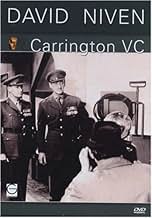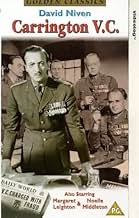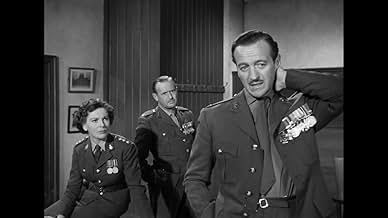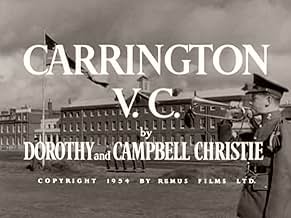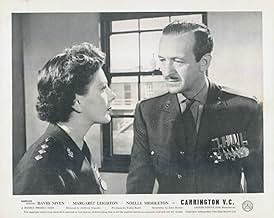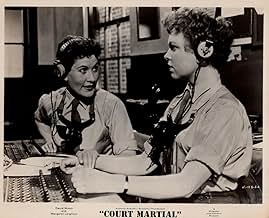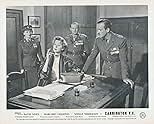Um tribunal marcial tenta descobrir por que, e se, um oficial desviou os fundos de sua unidade.Um tribunal marcial tenta descobrir por que, e se, um oficial desviou os fundos de sua unidade.Um tribunal marcial tenta descobrir por que, e se, um oficial desviou os fundos de sua unidade.
- Direção
- Roteiristas
- Artistas
- Indicado para 5 prêmios BAFTA
- 5 indicações no total
- Direção
- Roteiristas
- Elenco e equipe completos
- Produção, bilheteria e muito mais no IMDbPro
Avaliações em destaque
Major David Niven V.C. is up on charges. Two are minor, but the third one can break him, and possibly sent him to prison: that he surreptitiously took 125 pounds from the company safe. His defense is that he was owed the money, which no one denies, and that he told his Commanding Officer that he was going to do it. He told his wife, Margaret Leighton so over the phone; he also told fellow officer Noelle Middleton he had told his C.O. However, the C.O., Allan Cuthbertson, denies it. This being David Niven at the peak of his career, the movie is clearly slanted in Niven's favor, although the evidence presented to the Court is not. That's a necessary part of the dramatic tension.
Anthony Asquith directs this to bring out the ritual nature of Army life. The performances vary between those ritualized interactions, and things said in private in a very engaging fashion.
Asquith had begun his directing career in the silent era with a bang, with two late silent stunners, SHOOTING STARS and UNDERGROUND. Then something happened to his career in the mid-1930s. When he returned to directing in 1938, he specialized in films derived from stage works by Shaw, Rattigan and Oscar Wilde. The performances he got for these first-rate properties were wonderful, but they certainly seemed more staged plays than movies.
Although this movie is an original screenplay, it very much seems an opened-out play. Certainly, it is a a fine adaptation, but it would have taken little work to convert its borders to a proscenium arch. Despite this, it is a fine story with excellent performances all around.
Anthony Asquith directs this to bring out the ritual nature of Army life. The performances vary between those ritualized interactions, and things said in private in a very engaging fashion.
Asquith had begun his directing career in the silent era with a bang, with two late silent stunners, SHOOTING STARS and UNDERGROUND. Then something happened to his career in the mid-1930s. When he returned to directing in 1938, he specialized in films derived from stage works by Shaw, Rattigan and Oscar Wilde. The performances he got for these first-rate properties were wonderful, but they certainly seemed more staged plays than movies.
Although this movie is an original screenplay, it very much seems an opened-out play. Certainly, it is a a fine adaptation, but it would have taken little work to convert its borders to a proscenium arch. Despite this, it is a fine story with excellent performances all around.
Major Charles Carrington (David Niven), is arrested for taking £125 from the base safe, he also face two other charges that could finish his distinguished service career. He decides to act on his own defence at his court martial hearing, his argument being that he is owed a lot of money from the army for his various postings that have cost him out of his own pocket. To further complicate the proceedings, Carrington alleges he told his superior, the very disliked Colonel Henniker, that he was taking the money from the safe. A mans career, his marriage, and quite a few reputations, all hang in the balance.
Yes, well it is very British, of that there is no denying, it's very much heel to toe, cup of tea and chin chin chin. So with that in mind {i'm British myself by the way} this may grate on film viewers outside of the British Isles, but it's a really honest and interesting piece that scrutinises the British Court Martial system and rewards the court genre fans royally. Niven is, well Niven, he's always a solid professional who always earned his pay, and good support comes from the ladies of the piece, Margaret Leighton and Noelle Middleton, whilst i must give a mention to the seriously great Victor Maddern, an actor who was far from the A list of British greats but once you put the name to the face, you will see he was always memorable in what films he made.
So as a court room genre fan, and of course a staunch fan of British cinema, i'm going to rate 7/10 with a disclaimer that if those outside of my shores don't get it....well you just don't get it, {nudge nudge wink wink}.
Yes, well it is very British, of that there is no denying, it's very much heel to toe, cup of tea and chin chin chin. So with that in mind {i'm British myself by the way} this may grate on film viewers outside of the British Isles, but it's a really honest and interesting piece that scrutinises the British Court Martial system and rewards the court genre fans royally. Niven is, well Niven, he's always a solid professional who always earned his pay, and good support comes from the ladies of the piece, Margaret Leighton and Noelle Middleton, whilst i must give a mention to the seriously great Victor Maddern, an actor who was far from the A list of British greats but once you put the name to the face, you will see he was always memorable in what films he made.
So as a court room genre fan, and of course a staunch fan of British cinema, i'm going to rate 7/10 with a disclaimer that if those outside of my shores don't get it....well you just don't get it, {nudge nudge wink wink}.
This is quite a decent military court-room drama in which David Niven finds himself accused of pinching a large sum from his battalion funds. At the ensuing court martial, he must answer the charges relying on his honesty and integrity - he has a V. C. after all - and on receiving, somewhat naively, a reciprocal degree of honesty and integrity from others. It's quite a neat little story about revenge and snobbery; tempered with the odd bit of human decency and Niven is ideal for the part. Margaret Leighton is also quite good as his rather aloof wife and Allan Cuthbertson as his supercilious commanding officer "Col. Henniker" who clearly both have axes to grind. The ending isn't great, but otherwise it is a simple story well told.
Nearly a decade after 'A Matter of Life and Death' David Niven once more finds himself on trial - this time conducting his own defence - in this very respectable addition to the rollcall of theatrical adaptations directed by Anthony Asquith, although Niven himself neglects to mention in his memoirs.
In 'The Winslow Boy' the accused was charged with purloining a postal order, this time the bone of contention is £125 missing from a safe. Aside from the quality of the acting Asquith makes good use of acoustics by making the soundtrack totally devoid of music and the comic effect when Geoffrey Keen tells the court orderly to stop stamping in observance of an enormous sign reading 'Silence Court-Martial in Progress'.
In 'The Winslow Boy' the accused was charged with purloining a postal order, this time the bone of contention is £125 missing from a safe. Aside from the quality of the acting Asquith makes good use of acoustics by making the soundtrack totally devoid of music and the comic effect when Geoffrey Keen tells the court orderly to stop stamping in observance of an enormous sign reading 'Silence Court-Martial in Progress'.
When 125 pounds goes missing on a british military base, major carrington (niven) is brought in for questioning. Quite the suspense, since most of the people present in the room are sure he's guilty, guilty, guilty. Also some humor, as the sergeant at arms always makes a racket, as he stomps around and rattles the water glasses. Several people know what really happened, but can he convince them to tell the truth? Hopefully, they will respect an officer wearing the victoria's cross. A good story, very realistic. This film was made a couple years before niven's oscar winning separate tables. Directed by anthony asquith, son of the prime minister. Quite an interesting connection in asquith's bio here on imdb, involving oscar wilde. This film is also called carrington v.c.
Você sabia?
- CuriosidadesThe VC worn by David Niven was a genuine medal borrowed by the studio. It belonged to Arthur Henry Cross VC, Machine Gun Corps (Camberwell).
- Erros de gravaçãoA British court-martial appeal does not allow new evidence, as it is not a retrial of a case, but a trial of the trial itself, to argue improper procedure or other problems with the trial.
- Citações
Major Broke-Smith: What's he like?
Lt. Col. Reeve: Henniker? Proper bastard if you ask me.
- ConexõesRemade as ITV Play of the Week: Carrington V.C. (1960)
Principais escolhas
Faça login para avaliar e ver a lista de recomendações personalizadas
- How long is Court Martial?Fornecido pela Alexa
Detalhes
- Tempo de duração
- 1 h 46 min(106 min)
- Cor
- Proporção
- 1.37 : 1
Contribua para esta página
Sugerir uma alteração ou adicionar conteúdo ausente

